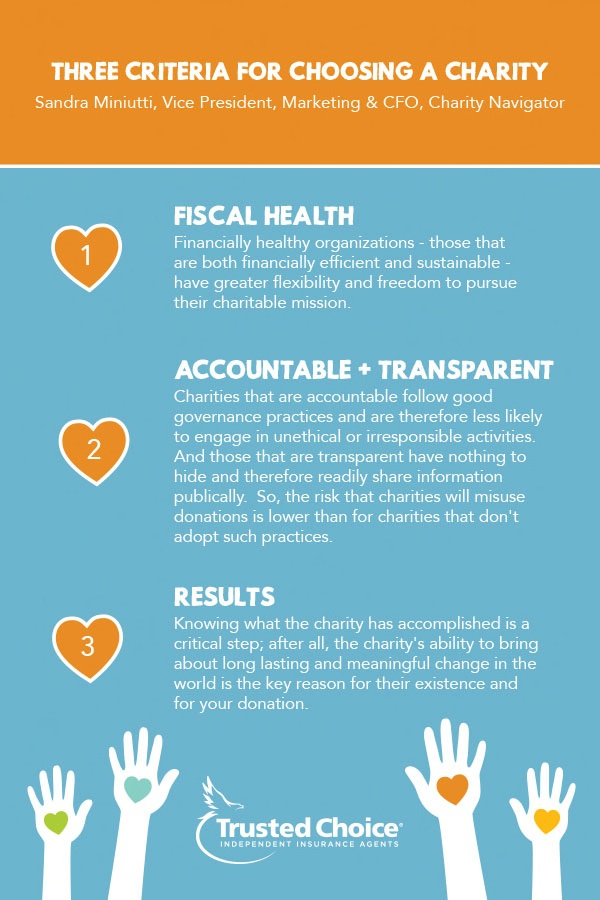7 Questions Smart Donors Ask When Choosing a Charity

Americans are a charitable bunch, giving more than $358 billion in 2014, according to research by the National Philanthropic Trust. That’s up 7.1% over 2013. And it's organization found that individuals represent the largest source of charitable giving at $258.5 billion, or 72% of total giving.
But in May 2015 there were approximately 1,521,052 charitable organizations in the United States. Media stories of fraud and other scandals related to charities have been ubiquitous in recent years, making some reticent about donating.
In general, however, giving is still safe and can be good for both your heart and your bank account. But how do you choose the right charitable organization? How do you know if a charity is a good investment? Are all charitable donations tax deductible?
In addition to asking these questions, there are specific considerations when you’re choosing the right charity. Selecting a charity using these criteria will satisfy your need to give and help you be financially savvy with your donations.
Here are seven questions to ask yourself when making this important choice.
1. Am I passionate about this charity?
If you’re like most people, especially if you’re a parent, you get solicitations from different charities and, feeling pressured to give, you do. But don’t just choose the first charity that reaches out to you. That's what Sandra Miniutti, Vice President of Marketing & CFO of Charity Navigator, says donors frequently do. “Too often donors give just because they are asked by a friend or via an appeal from a popular charity,” she explains. “It is critically important to reverse this process. Instead, take the time to find a charity that is a perfect fit to your philanthropic passions,” she adds.
Decide what you’re passionate about before choosing a charity. Organizations focused on animals, education, health, homelessness, hunger, religion and civic issues are all popular. And most charities that address those issues need help year-round to meet the needs of their constituents.
You’re sure to make a wise charity choice if you go with those that are most meaningful to you and your family.
2. Do I already know this organization?
Once you decide what issues compel you, consider giving to groups you already know. Start by looking around you, in your community or at work.
Look at local arts organizations, the PTA, local sports clubs, homeless shelters or animal rescue organizations and consider donating there. National organizations that you are very familiar with and passionate about their purpose that do fundraising drives through your employer or kids' school are also good options.
Remember, though, that smaller organizations often face challenges in raising funds that big organizations with substantial marketing budgets don’t have. So consider them first if they tug your heart strings.
Giving to organizations you already know, like and trust is always a great option for your donation dollars.
3. Is this charity legitimate or the one I think it is?
Now that you’ve identified your passions and some organizations, you want to make sure the charity is both legitimate and the one you think it is. Those are two different things but not understanding them can lead to being scammed, especially following major catastrophes or tragedies. Protect yourself from charity scams by educating yourself and commit to getting an in-depth understanding of how charities operate.
Moreover, if you want to donate to charities helping locally, make sure a charity with a local phone number and address is serving those in your community. Also, as news accounts have shown in recent years, lots of charities adopt names very similar to those of nationally known organizations but don’t represent those organizations.
There are lots of ways to determine if a charity is legitimate and is structured properly for charitable giving. There are many websites and databases that can help you avoid being scammed or choosing a charity that doesn’t fit your values. First, learn what a public charity is from the IRS. Then, check to see if the charity is licensed in your state.
Next, check the charity’s reputation with the Better Business Bureau’s Wise Giving Alliance or by searching online for media coverage and social media rankings of the organization. Then, check Charity Navigator, the American Institute of Philanthropy’s Charity Watch or GuideStar to see if it’s a legitimate charity, and to get ratings and recent news on charities.
If you’re considering a religious organization or ministry, go to MinistryWatch and Evangelical Council for Financial Accountability for information on those organizations. Talk to others who've donated to them, too.
All of these sites have multiple resources related to choosing charities well. So spend quality time on them learning about choosing charitable organizations before you make any donations.
4. Is this charity operating well?
Of course, there are many news stories on charities operating poorly. This has included some major organizations that had long been trusted to use charitable donations as promised or allow executive pay and spending consistent with their mission.
And while news stories are an indicator of trouble in the philanthropic world, Miniutti says, “Our research shows that the vast majority of charities are well-run.” She adds, “While the media is a very important tool in ferreting out the bad apples, they can convey the misperception that there are more bad apples in the nonprofit sector than there really are”
So, you’ll want to go deeper than news stories and obtain a charity’s tax filigs, or their “Form 990,” and read them carefully. If it’s of concern to you, also investigate nonprofit executive salaries before giving to an organization. Research their spending and results by looking at their annual reports and their websites for information on their outcomes and where their donations actually go.
Muniutti agrees with this strategy, saying, “Don’t just take them at their word or based on an inspirational story with little data. Yes, your heart is what motivates you to give. But then you want to look at real data – from the charity’s Form 990 and detailed reports on their results – to confirm they are a good place for your philanthropic investment.”

5. How did they respond to my questions when I spoke with their representatives?
You should call or visit organizations you’re considering for charitable contributions and speak to actual staff, not call center fundraisers. “Don’t just assume that you know what the charity does. Be sure to visit their site or office or call them to check under the hood and make sure the charity is doing the actual work that you want to support,” Miniutti says. “Well-run charities are eager to talk with donors,” she continues.
Ask for a development or fundraising office that is used to dealing with donors and can answer most questions. Ask whatever questions you have, no matter what they are. Be sure you know what a charity does, how it achieves its goals, how successful it is and how donated money is allocated. It’s best to know what questions to be sure you ask before reaching out.
Miniutti suggests you visit with executive directors or program staff if you’re contemplating a large donation.
And do a gut check after connecting with these organizations. Depending on how you connected with the organization, you’ll want to answer questions like:
- How do their answers resonate with me?
- Do I trust what they’re saying?
- Does what they’re saying support what I've already learned about the organization from other sources?
- How did I feel after visiting in person?
The way you feel after speaking with nonprofit representatives is important, so don’t ignore those feelings.
6. What are my financial position and plan for giving?
Know whether you’re in a financial position to give what you’re being asked to give. Avoid acting on emotional appeals to give. Take some time between the appeal and decision to think clearly about your donation.
Don’t allow yourself to be pressured into making contributions you can’t afford or committing to pledge plans that don’t fit your long-term budget. Because charitable donating is a form of investment, determine your level of comfort with investing in charities and only invest as much as you’re comfortable giving.
Then, have a plan for giving. “Create a giving budget. Will you give once a year in a big lump sum to 2 or 3 charities? Or would you rather set up a small monthly donation to each,” suggests Miniutti.
Think about how your giving fits into your overall financial plan and, depending on the amount you plan to give (or how you plan to give), you may want to speak to a CPA or financial planner.
7. Is my donation truly tax deductible?
This is a common question donors ask about their charitable contributions when choosing a charity. For your donation to be tax deductible, the organization must be registered with the IRS as a nonprofit or accepting donations through one that is. Yes, you should ask the charity you’re considering if they are. But don’t just take their word for it, especially if it’s a small charity or ministry.
Micah Fraim, CPA, a Roanoke, VA tax accountant, says, “To ensure that the charity is actually an approved IRS nonprofit, check the IRS Exempt Organizations Self-Check.” He says the database ”allows donors to search by EIN or name to make sure the organization is actually registered with the IRS.” He adds, “As long as the money is given to an IRS-approved nonprofit, most donations will be deductible.”
But he says there are conditions. “Total deductible donations cannot exceed 50% of your adjusted gross income. For certain private foundations the limit is 30%.” And he says that taxpayers can’t both take the standard deduction and itemize charitable deductions on an IRS Schedule A.
However, he clarifies, “If the total of the deductions on Schedule A (including charitable donations) exceeds the standard deduction, then that is what they would take.” He says the taxpayers that get the most benefit are those already itemizing deductions like home mortgage interest or real estate taxes.
He cautions taxpayers when it comes to non-cash donations, though. “Taxpayers need put reasonable values on non-cash donations. There are different ways to value the items donated, but the most common is 'thrift shop value'. Trying to claim your Goodwill donations are worth what they were when you bought them will get you into trouble.”
Finally, when choosing a charity, if you can answer all of these questions, “then you’ll feel better about saying 'no' when a random charity asks you for support, because you’ll know that you already gave to a well-run charity that’s doing good work,” concludes Miniutti. And you'll have a plan for giving that fits your finances.
